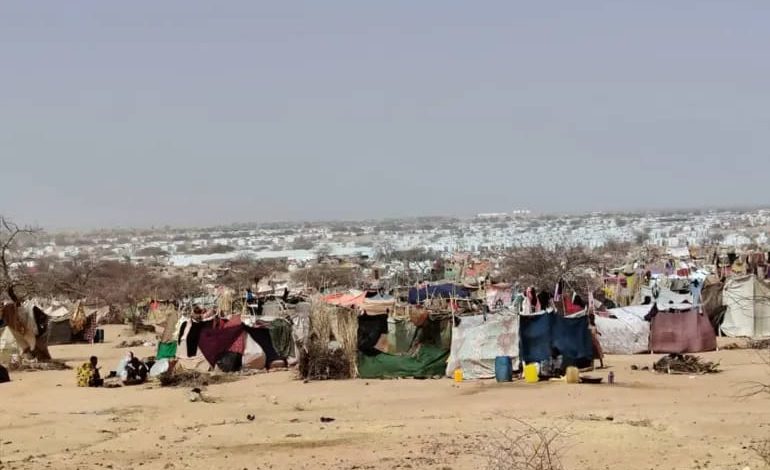Can Chad Save the Future of Sudanese Refugee Students?

Sudan Events – Agencies
The Chadian government officially announced, two days ago, its approval to host the postponed 2024 Sudanese high school certificate exams on its territory. According to the Chadian news site Rafik Info and informed Sudanese diplomatic sources, the exams are set to begin on June 29 and continue until July 10.
Chadian Foreign Minister Abdoulaye Sabre Fadoul confirmed in an official meeting with the Sudanese chargé d’affaires in N’Djamena that Chad “agrees to hold the exams,” calling for direct coordination with the Chadian Ministry of Higher Education and relevant United Nations agencies to implement the decision within an appropriate timeframe and with consideration for the humanitarian conditions of the refugee students.
In December of last year, N’Djamena had previously rejected the idea of holding exams for Sudanese students inside refugee camps, sparking widespread discontent among students and their families amid a lack of educational alternatives.
Broad Mobilization
With worsening security conditions and a near-total halt to education across most parts of Sudan, the issue of high school students has become a focus of public appeals and collective mobilization. This pushed Sudanese authorities—particularly the Ministry of Higher Education and Scientific Research—to launch coordinated efforts over several months, ultimately gaining the green light from Chadian authorities in early June.
According to officials from the Ministry of Education in the Darfur regional government, more than 8,000 Sudanese refugee students are fully prepared to take the exams in the cities of Abéché and N’Djamena.
Speaking to Al Jazeera Net, Darfur Regional Minister of Education, Touhida Abdelrahman Youssef, said, “What has been achieved is not just an educational gain—it represents national unity, involving executive, political, and international actors, from the Sovereign Council and the Ministry of Foreign Affairs to UNICEF and the Chadian authorities.”
She added that the approval brings renewed hope to students after two years of uncertainty and lays the foundation for a rare academic struggle in a region overwhelmed by conflict and crisis. Preparations are already underway, she confirmed, with full government commitment to securing the exam process and overcoming all obstacles.
On the Ground
Mohamed Yahya Marsal, coordinator of the emergency response room in the border region of Tina, told Al Jazeera Net that Chadian authorities have already begun identifying exam centers for refugees, with the exams to be held in Sudanese Friendship Schools located in Abéché and N’Djamena.
He explained that students are enduring extremely harsh conditions. “Some of them study under tents without lighting or chairs, but their determination has overcome the hardships, and the hope these exams have given them is beyond words.”
Logistical Challenges
Marsal revealed that Sudanese and Chadian authorities are coordinating efforts to transport students from various camps to the examination centers. The process will be supervised jointly by educators, with strict security measures in place to ensure the integrity and fairness of the exams.
While the Chadian decision to host the Sudanese high school exams has been widely welcomed, educators and those involved in education have warned of logistical complications that could hinder the practical implementation of the exams, especially given the weak infrastructure in refugee areas.
Mohamed Adam Ishaq, a secondary school teacher in North Darfur State, said this is a national and humanitarian mission requiring high-level coordination. He stressed the need to mobilize Sudanese teachers currently in the refugee camps in Chad to oversee and prepare the examination centers.
Speaking to Al Jazeera Net, he added, “The exam environment in refugee settings demands technical skills and considerable field experience. We cannot move forward without real support.” He emphasized the importance of addressing students’ psychological and educational needs before focusing on administrative aspects, pointing out that most students are suffering from the effects of war, the loss of loved ones, and the trauma of displacement.
Teacher Ishaq affirmed that students have shown remarkable resilience and determination, saying, “We see them studying under trees, in tents without chairs or lights, but their dream of success motivates them every morning.”
Persistent Challenges
On the ground, challenges remain. Students preparing to sit for the Sudanese high school exams in refugee camps in eastern Chad lack even the most basic educational tools. There are no suitable classrooms, limited educational supplies, and, in some cases, a shortage of qualified staff.
Souad Ibrahim, a teacher at a temporary school in the “Ardimi” camp, told Al Jazeera Net, “Students are studying under extremely difficult conditions—no electricity, no equipment. Some work in the market during the day to support their families and attend classes in the evening.” She added, “We’re doing our best, but we urgently need more support from partners to provide a learning environment that respects these young people’s determination to shape their future.”
Meanwhile, refugee student Mohamed Issa, 20, fled from El Fasher in North Darfur after his school was destroyed. He told Al Jazeera Net, “I dreamed of becoming an engineer. The war erased everything, but the news about the exams brought back hope. I review my lessons using old notebooks and handwritten summaries.”
His classmate, Safia Abdullah, who lost her father in the war, added, “I’m the sole provider for my family in this camp, but I still hold on to my dream. I don’t want to be just a refugee—I want to finish my studies and become something one day.”
Mental Health Neglect
Humanitarian workers have raised concerns about the near-total absence of psychological support in educational centers within the camps, even though the students’ circumstances make such support crucial.
Mustafa Bura, an employee at a local relief organization, told Al Jazeera Net that most students show signs of post-traumatic stress, evident in their behavior and general mood in the camps. He added, “No professional psychological support programs have been provided, even as more new arrivals come from areas like El Fasher—further increasing the pressure on students and the already overwhelmed camp infrastructure.”
Source: Al Jazeera



